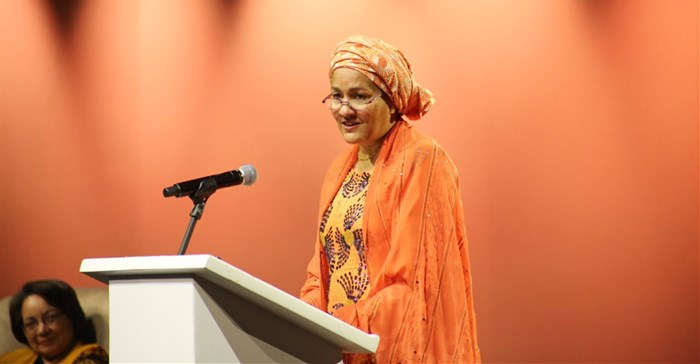
Top stories

Marketing & MediaAds are coming to AI. Does that really have to be such a bad thing?
Ilayaraja Subramanian 3 hours





More news












ESG & Sustainability
Crisis for Deaf South Africans as video relay service provider faces closure





The former minister of Nigeria gave a rousing talk on 'Centring Gender: Reducing inequality through inclusion and sustainability', receiving a standing ovation and moving those in attendance to a spontaneous, emotional rendition of the 1980s women's liberation song "Malibongwe".
She spoke of the solidarity between Nigeria and South Africa during the liberation struggle and how this camaraderie is needed now more than ever as the world faces a leadership vacuum that threatens peace, development and human rights.
"President Mandela once observed that the depth of oppression in South Africa at that time created the height of character demonstrated by leaders of the African National Congress. I believe solidarity and the deep sense of one's right to justice kept the flame alight. And that in itself is a warning that we should not take for granted," she said.
"Given the opportunity to participate fully, we have in half our population the capacity, the resources, and the potential to address the most pressing challenges that we currently face. What is needed is to break down institutional and attitudinal barriers and invest in the core contribution of women and girls to their societies and their countries," said Mohammed.
NelsonMandela: What some of the audience thought of #NMAL2017 delivered by AminaJMohammed: https://t.co/O4eQwbWy10 What did you think? #CenteringGender #WhyGender pic.twitter.com/BUfHCOoHEw
— #AfricaIsRising (@Africa_IsRising) November 25, 2017
She spoke of gender equality being central to Mandela's vision of equality for all, and how similar leadership is needed globally in order to achieve transformation and sustainable change. Mohammed noted appalling statistics that reflect the current context of gender inequality globally:
In South Africa the stats are just as bleak, she noted:
In terms of financial exclusion, unpaid domestic work falls on three times as many women as it does men and for the least compensation, she said. In the formal workplace, women earn on average 70c to every dollar that is earned by a man. Looking at a report recently issued by the World Economic Forum, Mohammed noted that the gender equality gap isn't closing at all. In fact it's increasing. According to the report, it would take 217 years to equalise pay and employment opportunities for men and women - this number has increased substantially from the 170 years calculated in 2016.
"The empowerment of women is more than a social imperative or a matter of justice. It is essential to achieving sustainable development, protecting our environment and securing peace," she said.
"According to the World Bank, girls who finish school earn more than 70% more than girls who have to drop out, and that boosts GDP annual growth rates by 1.5%. So if we're not thinking about the rights, think about the economies. When women are kept out of the labour force, everyone pays the price."
Women's equal participation in the labour force has the potential to unlock over $12tn in global growth, she said, "and that money could be used to further access education, health, and services for all; not just women, for all," she emphasised.
Thank you to everyone who attended or engaged with the #NMAL2017 - we loved our speaker @AminaJMohammed, as well as interacting with our audiences. Here's to fighting gender inequality. And to #NMAL2018 and beyond! pic.twitter.com/6CjBgKF3VE
— NelsonMandela (@NelsonMandela) November 25, 2017
Comprising 17 goals and 169 targets, the 2030 Sustainable Development Agenda goes beyond social development, she explained, but to realise its full potential, focus must be on inclusion and leaving no-one behind, including young people - boys and girls.
"I've spoken at length about women and equality because it is true that women continue to be less equal than men globally, but gender is not equal to women. Gender inequality norms and stereotypes affect men, women, girls and boys. The same educated girls were the same girls that were kidnapped by the uneducated Boko Haram terrorists.
"When young boys are taught that it is not manly to cry, they learn to suppress their emotions. When young men are taught that violence is masculine and accepted, we create the next generation of those who seek solutions at the barrel of a gun. When societies dictate the role of men as breadwinners or aloof and distant fathers, we disempower families and create public policies that don't match the realities of our households, our communities and our societies."
"Gender inequality affects every one of us, and addressing it is equally our shared responsibility," she said.
Mohammed called on leadership at all levels to take inspiration from Madiba in how he dealt with seemingly insurmountable, unending challenges, and invest in women and girls, contributing to the global movement in whatever way, big or small. She also implored that we talk more and louder about the achievements of the women and girls of Africa. The collective responsibility of leaders to end gender inequality should be embraced, she said, ending her lecture with a call to action.
"Invest in the missing 50% of our human asset base and the potential of women. Unleash their power for good, and make good on the new era of the sustainable development goals, starting at goal five as your docking station for the other 16 goals that will create a world of true gender equality."
Mohammed was appointed to her current role at the UN in January 2017. Previously, she was special advisor to former UN secretary-general Ban Ki-Moon. Prior to joining the UN, she worked for three successive Nigerian administrations. She is also an adjunct professor in Development Practice at Columbia University.
